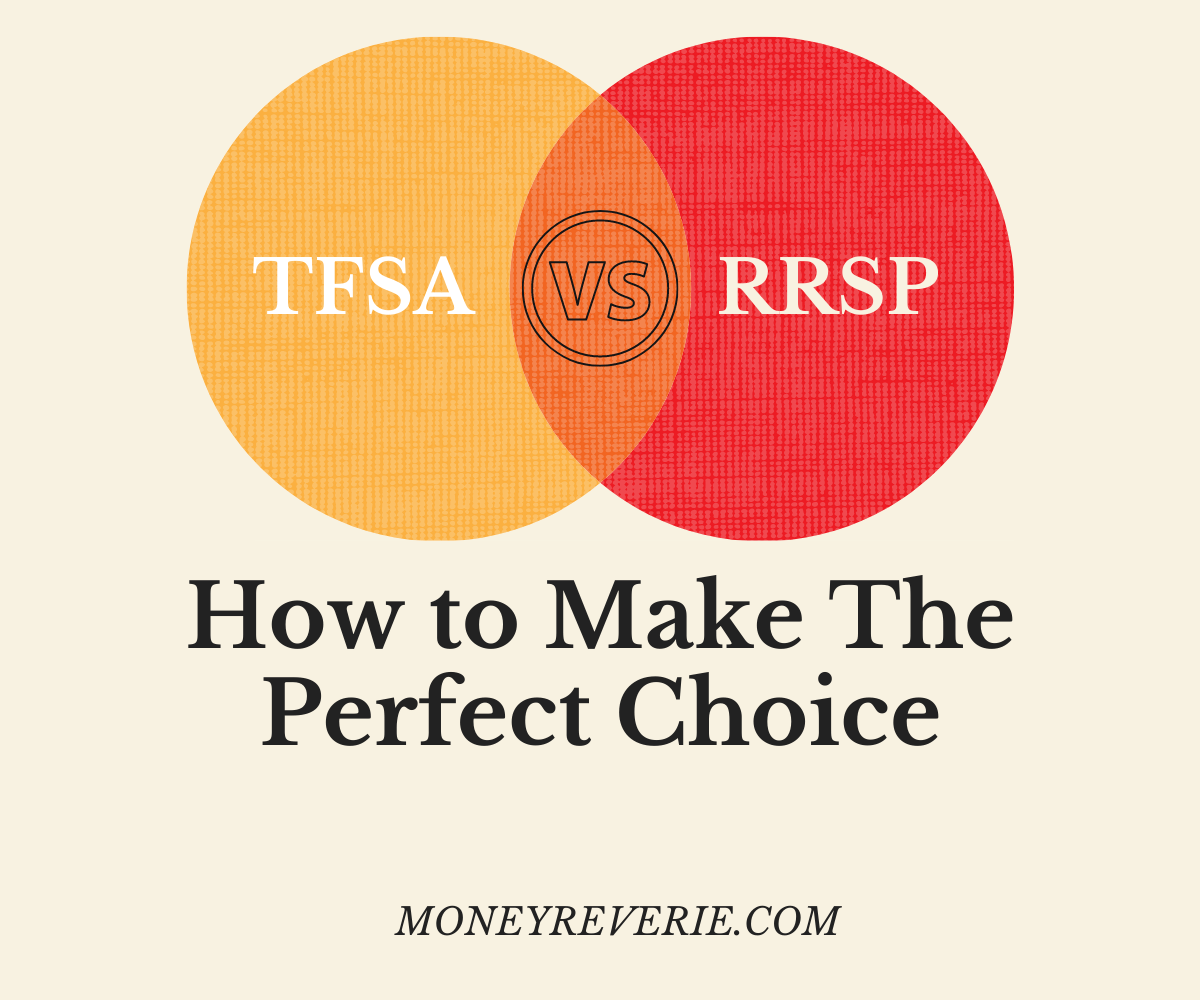Do you want to save for the future and get a tax break but you are wondering which of the two popular investment vehicles available to Canadians, the Tax-Free Savings Account (TFSA) and the Registered Retirement Savings Plan (RRSP) you should go for?
TFSA and RRSP are the most popular savings accounts in Canada, both offer different tax advantages, rules, and features that can make one more suitable than the other for your individual financial goals and circumstances.
The question of which is better between TFSA vs RRSP is often asked by “newbie” investors who want to make the most of their money (or savings). In this blog post, I will explore the differences between them to help you make an informed decision on which is best for you.
TFSA vs RRSP: Comparing Key Features
- Primary Use: RRSPs are typically used to save for retirement while TFSAs are used to save for any purpose, such as investment, mortgages, or other purposes.
- Eligibility: You must be the age of majority in your province or territory of residence to open a TFSA account in any bank. However, you cannot start contributing to your RRSP until you earn employment income.
- Contribution Limit: For 2024, the TFSA contribution limit is $7,000, while your 2024 contribution limit for RRSP is 18% of your earned income or $31,560.
- Unused Contribution Room: Your unused contribution room is carried forward for both RRSPs & TFSAs.
- Withdrawals: RRSP withdrawals are taxable and TFSA withdrawals are tax-free.
- Withdrawn Amounts: When withdrawing funds from an RRSP, the contribution room is lost for amounts withdrawn and for a TFSA, withdrawn amounts are added back to the contribution room in the following year.
- Taxation: TFSA contributions are not tax-deductible and RRSP contributions are tax-deductible.
- Plan Maturity: No age limit for TFSA but an RRSP matures at the end of the calendar year when you turn 71.
- Spousal Plan: While there is nothing like a spousal TFSA, you can contribute directly to your spousal RRSP.
What is a Tax-Free Savings Account (TFSA)?
A TFSA is a registered investment savings account in Canada that allows you to save or invest your money without being subject to any tax deduction. It allows you to save ETFs, GICs, stocks, bonds, and cash without any tax on your savings or investment income, such as capital gains and dividends.
Any income, interest, stock dividends, or capital gains earned on your TFSA is not subject to income taxes. However, your contributions to TFSA don’t reduce your taxable income.
In addition, a TFSA doesn’t impose taxes on administrative, interest or debt related to your TFSA account. It is designed for multi-purpose investing. Unlike regular accounts devoted to particular uses, you can use TFSA however you like. You can use TFSA to invest in stocks, bonds, GICS, or mutual funds.
Related: Can you have more than one TFSA?
Pros
- Tax-free savings over time.
- No minimum income requirements.
- Easy withdrawals.
- Emergency fund.
- Maximizes retirement savings.
- No expiry date.
Cons
- Strict penalties for over-contribution (1% monthly interest).
- No tax refund.
- Annual contribution limit.
- No spousal plan.
What is a Registered Retirement Savings Plan (RRSP)?
An RRSP is another registered account that holds investments and savings. was introduced in 1956 to help Canadians prepare for retirement. This account doesn’t impose taxes on contributions and earnings such as interest or capital gains.
A significant advantage of the RRSP is that you can contribute large amounts of money each year as it helps to reduce your taxable income. Thereby allowing you to defer your taxes while saving for retirement.
Like TFSA, you can use RRSP to invest in different investment vehicles such as stocks, bonds, mutual funds, GICs etc. However, unlike TFSA, which has no expiry date, you are expected to convert your RRSP to RRIF by December 31 of the year you reach the age of 71.
In contrast to the TFSA, you have to pay taxes when you withdraw from your RRSP.
Related: Withholding Tax RRSP
Pros
- Spousal plan.
- Investment-friendly.
- Tax-free contribution.
- Tax refund.
Cons
- Expiry date.
- Withdrawal tax charges
- Strict withdrawal rules
- Permanent loss of RRSP contribution room
TFSA vs RRSP: Contribution Rooms
Contribution room, also known as deduction limit or contribution limit, refers to the maximum annual amount you can contribute to your registered accounts.
The Canada Revenue Agency (CRA) sets the annual RRSP contribution room. For 2023, the RRSP contribution limit is $30,780. However, for those with 18% pre-tax income that exceeds the contribution limit of the current year, the annual contribution limit is their contribution room.
Therefore, by increasing your income growth and carrying forward your unused contribution limit, you increase your contribution room annually. RRSP contribution deadline varies year by year. But the deadline to make 2023 RRSP contributions is March 1, 2024.
On the other hand, the TFSA contribution room is determined by your unused contribution room and current annual contribution room. If you have not used TFSA since its launch in 2009, you have a big contribution room.
This is because your cumulative contribution room will be calculated from 2009 to date (which amounts to $88,000 in 2023). Your unused TFSA contribution room is rolled over to the next year.
In 2023, the contribution limit for TFSAs is $6,500. However, over-contributing to a TFSA is not permitted. This refers to contributions that exceed your maximum contribution room.
Over-contributions are penalised by the Canada Revenue Agency (CRA) at 1% a month, but not until the excess contribution is withdrawn.
TFSA vs RRSP: Saving for Retirement
If you want to save more for retirement, consider opening an RRSP account. RRSP allows you to delay paying taxes right from when you’re young until retirement.
However, you can open a TFSA account to gain a tax advantage on your emergency savings. So after you have maxed out your RRSP contribution limit, you can open a TFSA account to complement your RRSP savings.
Take these two scenarios as examples:
- Jude is a medical doctor, age 35. Jude is currently under a higher tax bracket but expects to fall under the low tax bracket during his retirement. As a result, Jude considers RRSP the best account since it will defer his taxes until his tax rate will be lower.
- Jane is an accountant, aged 35. Jane is currently under the middle-income bracket and is looking to save for emergencies. As a result, Jane opens a TFSA account since it’s flexible and allows her to withdraw at any time. A TFSA account will allow Jane to supplement her RRSP savings to have enough funds for her retirement.
TFSA vs RRSP: Saving for a Home Down Payment
If you are saving to buy a new home, you may want to consider opening an RRSP account rather than a TFSA account.
The RRSP Home Buyers’ Plan (HBP) allows you to make tax-free withdrawals on your account up to $35,000. However, you’re expected to refund the withdrawn amount within 15 years.
Take these scenarios as examples:
- Mark is a banker aged 33 looking for the best account to save for his down payment alongside his retirement. As a result, Mark opens an RRSP to save for his retirement while getting up to a $35,000 tax-free down payment. An RRSP is also proper for Mark because it will help him commit to his retirement savings since early withdrawals attract penalties.
- Paul is a mechanical engineer, aged 35. Paul wants to save for emergencies, down payments and retirement. However, he’s under the mid-income bracket. As a result, Paul opens a TFSA account since it allows him to withdraw at any time without losing his contribution room.
TFSA Vs RRSP: Which is Better for you?
Choosing between TFSA vs RRSP can be a tough decision, especially for newbies. Both offer tax advantages but you need to decide which is better for your unique financial situation and goals.
Your income, investment timeline, and other factors will also affect your decision. Therefore, consider all the pros and cons of each and determine which option aligns best with your objectives.
Also note that it’s possible to use both investment vehicles simultaneously, allowing you to maximize your savings potential.
The truth is that RRSPs and TFSAs are great but not suitable for everybody. I wish I had known this years ago! So, to determine which account is perfect for you, consider the following three factors:
1. Your Savings Goal
If you’re planning for retirement, an RRSP could be your ideal option. With an RRSP, you can defer paying taxes right from your young age to retirement, when your tax obligations might be lower.
However, TFSA is not specifically built for retirement savings but could complement your retirement savings due to its flexibility. So it is wise to consider a TFSA when you have maxed out your RRSP contributions to benefit from tax-free growth and withdrawals.
2. Your Income Tax Bracket
If you have a high income, you are likely to have a high tax bracket; if you have a low income, you may have a lower tax bracket.
Consequently, you might consider putting funds into a TFSA if you fall under a low tax bracket to build up your capital. Once you reach a higher income bracket, you can safely transfer your TFSA funds to an RRSP to reduce your income taxes.
So if you have a low income, you can go for TFSA. But if you have a high income, RRSP might be a perfect choice.
3. Your Time Horizon
TFSA and RRSP differ through investment timeframe. RRSPs are primarily for retirement savings, they are more suitable for long-term savings or investments.
On the other hand, TFSAs are more suitable for short and medium-term savings investments due to their flexibility.
The process of saving for retirement usually takes longer than saving for your child’s education or remodelling your house. RRSPs are designated for retirement, but TFSA covers you if you need money to fund emergency expenses anytime.
Final Thoughts on TFSA vs RRSP
Both TFSA and RRSP are great savings and investment vehicles with tax advantages. However, your goals, income bracket, and time horizon should help you determine which is better for you.
TFSAs are flexible compared to RRSPs to achieve short or medium-term goals. But RRSPs are strictly long-term vehicles that maximize your retirement savings tax-free over time.
You can probably save more through RRSP, but strict rules are attached, especially on making withdrawals.
However, if possible, you should have both an RRSP and a TFSA account to enjoy the benefits of the two accounts and complement their shortcomings.









